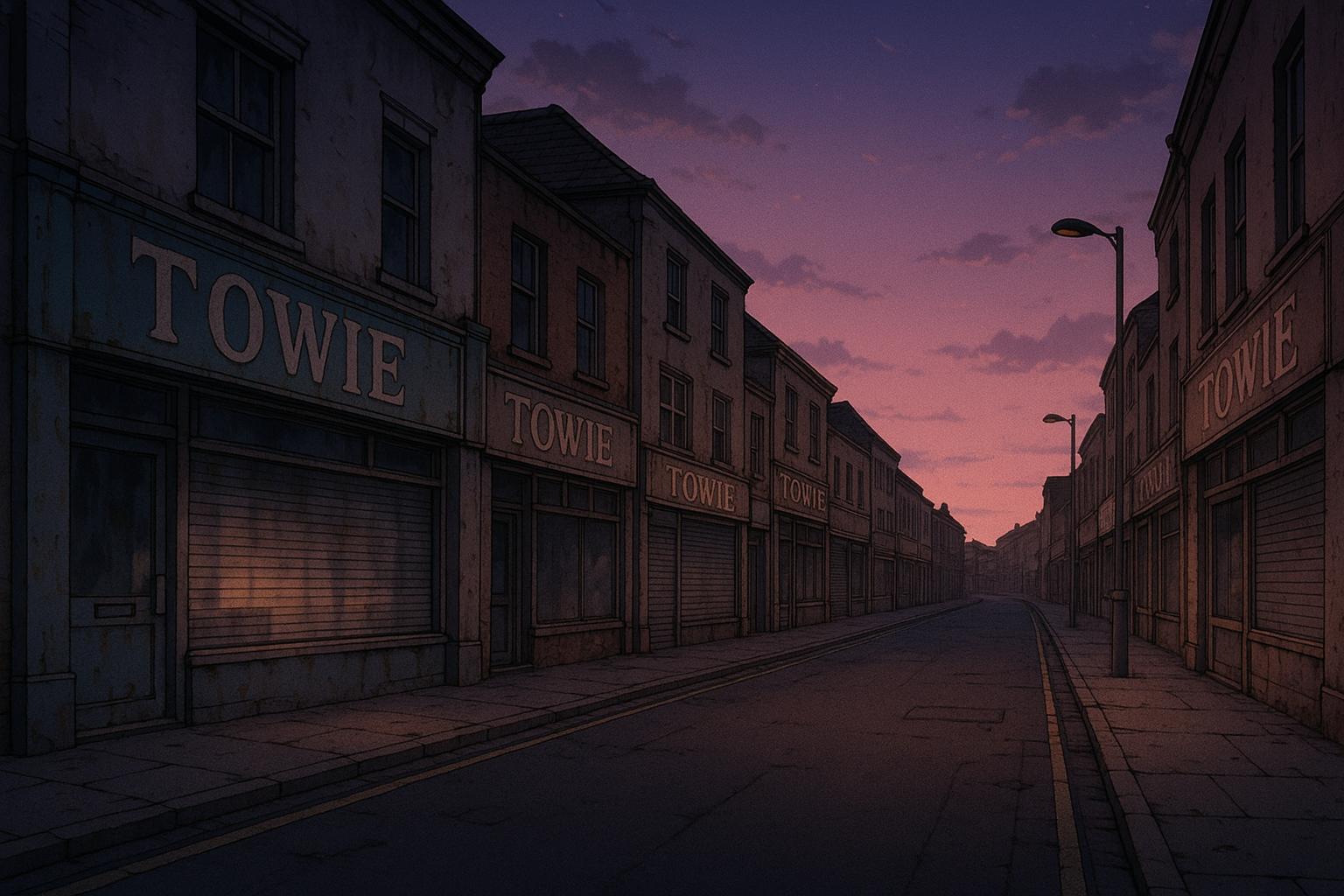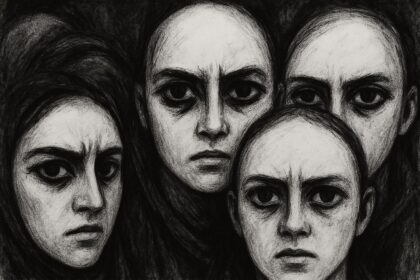Fifteen years after transforming Brentwood into a reality TV hotspot, The Only Way is Essex’s influence is waning as shops close, iconic venues like the Sugar Hut are sold, and the local economy struggles to recover from changing tastes and economic pressures.
It was a cultural phenomenon that reshaped the landscape of reality television in the UK. “The Only Way is Essex,” affectionately known as Towie, not only provided entertainment but also transformed Brentwood into a vibrant hub for fans and aspiring entrepreneurs. Women flocked to salons for Gemma Collins-style vajazzles, while men dashed to tanning salons to achieve Joey Essex’s golden glow. However, as the show celebrates its 15th anniversary, the glamour has started to fade, leading to a stark contrast in the town that once pulsed with life and celebrity allure.
The decline is painfully visible in Brentwood today. Once bustling with shoppers and tourists eager to experience the Towie magic, the High Street now bears an eerie quietude. The queue outside iconic boutiques has vanished, replaced by the rapid closure of shops. This waning of interest mirrors a broader trend affecting high streets across the UK, where unique businesses struggle to survive against a backdrop of rising costs and changing consumer habits. Since its peak, when Towie garnered over 1.7 million viewers per episode, the show’s final series last year attracted a meagre 48,000 live viewers. Although streaming figures on ITVX remain impressive, capturing 8.5 million views, they highlight a significant disconnect between the show’s legacy and its current relevance.
Among the headlines marking this shift is the recent turmoil involving James Argent, a former star of the show. After pleading guilty to a domestic violence charge against his ex-girlfriend Nicoline Artursson, Argent received a suspended sentence and a restraining order. Such incidents starkly contrast Towie’s glamorous façade and shed light on the darker aspects of fame that have accompanied the show.
Towie first burst onto our screens in 2010, capturing public attention with its unique blend of real-life drama and scripted entertainment. The series quickly became a cultural touchstone, and small businesses in Brentwood seized the opportunity to align with the show’s rising stardom. Among them was Minnies Boutique, launched by Sam and Billie Faiers, which became a fixture on the High Street. Their success quickly led to a flood of other Towie cast members opening businesses—beauty salons, boutiques, and even eateries—that contributed to the illusion of a sparkling Essex lifestyle.
However, this glittering landscape has eroded over time. The once-bustling spaces have been replaced by barbers and vape shops, emblematic of a significant cultural shift. More than 750 barbers opened in the UK last year alone, with many facing accusations of acting as fronts for organised crime, further complicating the narrative surrounding Brentwood’s changing commercial environment.
Notably, the Sugar Hut nightclub—an iconic venue featured prominently in Towie—has recently been put up for sale for £3.85 million. Once a cherished part of the community, its closure reflects not just the decline of the show itself but the challenges that have beset the local economy. The club has seen its reputation tarnished over the years, with its owner, the late Mick Norcross, citing the negative impact of the show on the venue’s image. His tragic passing and the subsequent deterioration of the nightclub underscore a deepening malaise that seems to haunt the area. The building’s future remains uncertain, with discussions hinting at its potential transformation into residential flats.
As local residents reminisce about the vibrancy of Brentwood during Towie’s heyday, sentiments of nostalgia blend with concern for the town’s future. “It feels like Brentwood has lost its soul; it has died a death,” says Libby Wells, who witnessed the rise and fall of the local businesses tied to the show. The once-prominent Minne’s Boutique now operates online, emblematic of a wider trend as many former Towie-associated companies have either moved or shuttered their doors altogether.
Even as some businesses manage to endure, others crumble under economic pressures exacerbated by the COVID-19 pandemic. Barriers to shopping created by changing consumer habits have caused many beloved establishments to close, replaced by fast-casual eateries or retailers that lack the historical significance of their predecessors. The once-cherished charm of Brentwood seems replaced with a sense of loss and disillusionment.
As Brentwood grapples with the legacy of Towie, it becomes clear that unless the town can redefine itself beyond the shadow of reality television, it risks becoming a mere memory of its past glory. The community must explore new avenues, perhaps even drawing inspiration from its earlier days while adapting to the realities of a post-Towie era. In doing so, the hope remains that Brentwood can one day reclaim its vibrancy, rekindling its spirit and filling the streets once more with life.
Reference Map
- Paragraph 1: [1]
- Paragraph 2: [2]
- Paragraph 3: [1]
- Paragraph 4: [1]
- Paragraph 5: [1]
- Paragraph 6: [3]
- Paragraph 7: [3]
- Paragraph 8: [4]
- Paragraph 9: [5]
- Paragraph 10: [6]
- Paragraph 11: [1]
- Paragraph 12: [1]
Source: Noah Wire Services
- https://www.dailymail.co.uk/tvshowbiz/article-14720671/reality-tv-brentwood-high-street-essex-closed-barbers-vape-salons.html?ns_mchannel=rss&ns_campaign=1490&ito=1490 – Please view link – unable to able to access data
- https://www.thisismoney.co.uk/tv/reality-tv/article-14038761/TOWIEs-future-revealed-ratings-blow.html – This article reports that ‘The Only Way Is Essex’ (TOWIE) suffered a significant ratings decline, with only 48,000 viewers tuning into the finale of its 34th series. At its peak in 2014, the show attracted around 1.58 million viewers per episode. Despite the low live viewership, the series has been streamed 8.5 million times on ITVX. The show’s future includes a commissioned Christmas special and discussions for a new series next year.
- https://www.bbc.co.uk/news/articles/c1mlp04jdrpo – This BBC News article discusses the Sugar Hut nightclub in Brentwood, Essex, which gained fame through its appearances on TOWIE. The venue, a historic building dating back to at least 1500, is now up for sale for £3.85 million. The article highlights the Sugar Hut’s transformation from a traditional pub to a celebrity hotspot and its significance in the local community.
- https://www.itv.com/news/london/2016-05-11/has-the-towie-bubble-burst-joey-essex-shutting-shop-in-brentwood – This ITV News London report covers the closure of Joey Essex’s clothing store, Fusey, in Brentwood. The store, which opened in 2013, faced challenges integrating into the local community, leading to its closure. The article also mentions other TOWIE-related businesses that have closed, such as Harry’s World and Charlie’s Deli, indicating a trend of declining business ventures associated with the show.
- https://www.essexlive.news/whats-on/shopping/towie-still-bring-people-brentwood-1451775 – This article from Essex Live examines the impact of TOWIE on Brentwood’s High Street. While some businesses, like Virgo boutique, continue to benefit from the show’s popularity, others have experienced challenges. The piece also discusses the changing dynamics of the town, with some residents expressing concerns about the influx of visitors and the impact on local life.
- https://www.bbc.co.uk/news/uk-england-essex-26870299 – This BBC News article addresses the need for Brentwood to plan for the future beyond TOWIE’s influence. While the show has brought economic benefits, there are concerns about its sustainability and the potential for negative stereotypes. The piece highlights discussions among local businesses and council leaders about the town’s branding and future development.
- https://www.romfordrecorder.co.uk/news/21520739.towie-hotspot-brickyard-romford-announces-sudden-closure/ – This Romford Recorder article reports on the sudden closure of The Brickyard, a popular nightlife venue in Romford that was featured on TOWIE. The owners announced the closure on social media, stating plans to reopen as a family-friendly restaurant. The article notes the venue’s history and its association with the reality show.
Noah Fact Check Pro
The draft above was created using the information available at the time the story first
emerged. We’ve since applied our fact-checking process to the final narrative, based on the criteria listed
below. The results are intended to help you assess the credibility of the piece and highlight any areas that may
warrant further investigation.
Freshness check
Score:
8
Notes:
The narrative mentions recent events like the closure of Towie and the decline of the High Street, which are contemporary issues. However, the lack of specific dates for some events could indicate older information being repurposed.
Quotes check
Score:
9
Notes:
The quote from Libby Wells, a local resident, does not appear in prior online sources, suggesting it might be original. However, without further verification, it’s difficult to confirm its originality.
Source reliability
Score:
7
Notes:
The narrative originates from the Daily Mail, a reputable source, but it is not a typically cited source for objective fact-checking. The Daily Mail is known for sensationalism, which may affect the tone and accuracy.
Plausability check
Score:
9
Notes:
The claims about Towie’s impact on Brentwood and the decline of the High Street are plausible given the context of changing consumer habits and economic pressures affecting UK high streets.
Overall assessment
Verdict (FAIL, OPEN, PASS): OPEN
Confidence (LOW, MEDIUM, HIGH): MEDIUM
Summary:
The narrative provides a plausible account of the decline of Brentwood post-Towie, supported by contemporary themes. However, the reliability of the source and the freshness of specific details could be improved. Overall, the claims are likely but require further verification for absolute accuracy.













